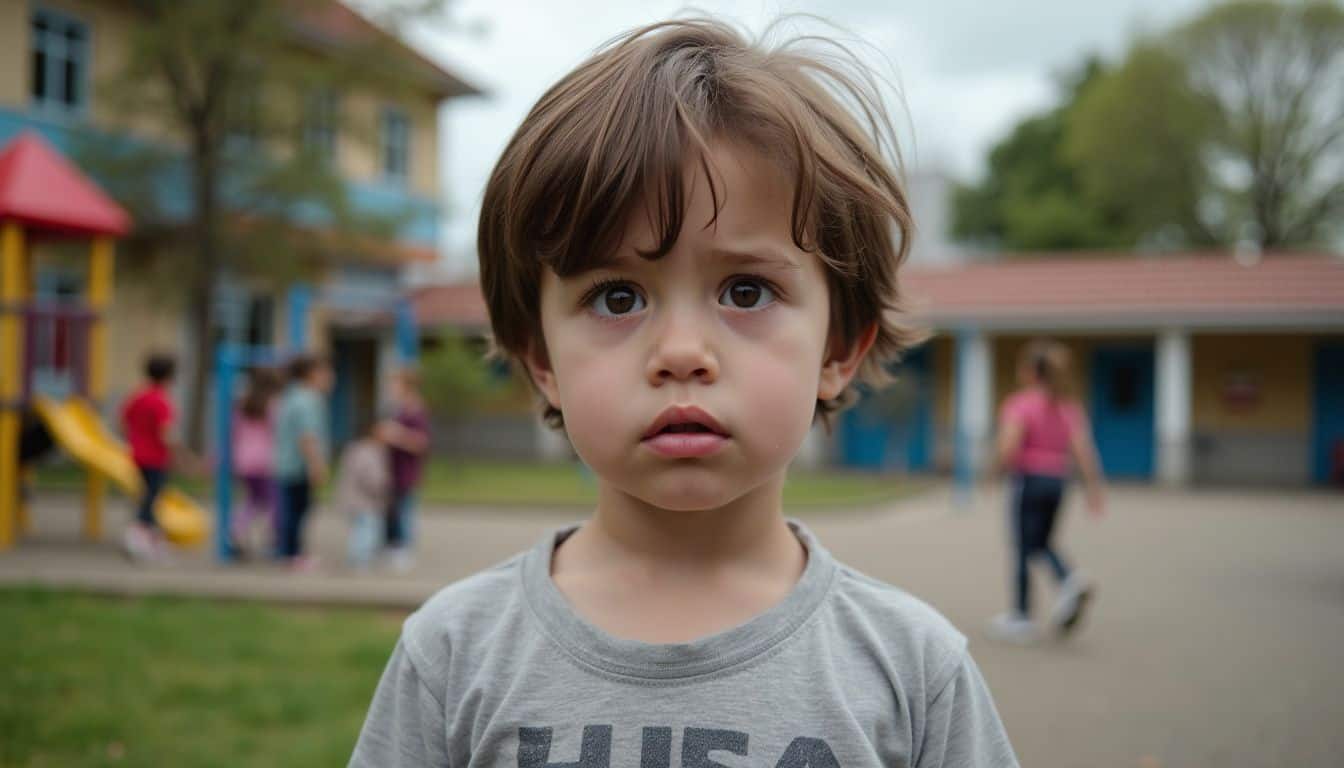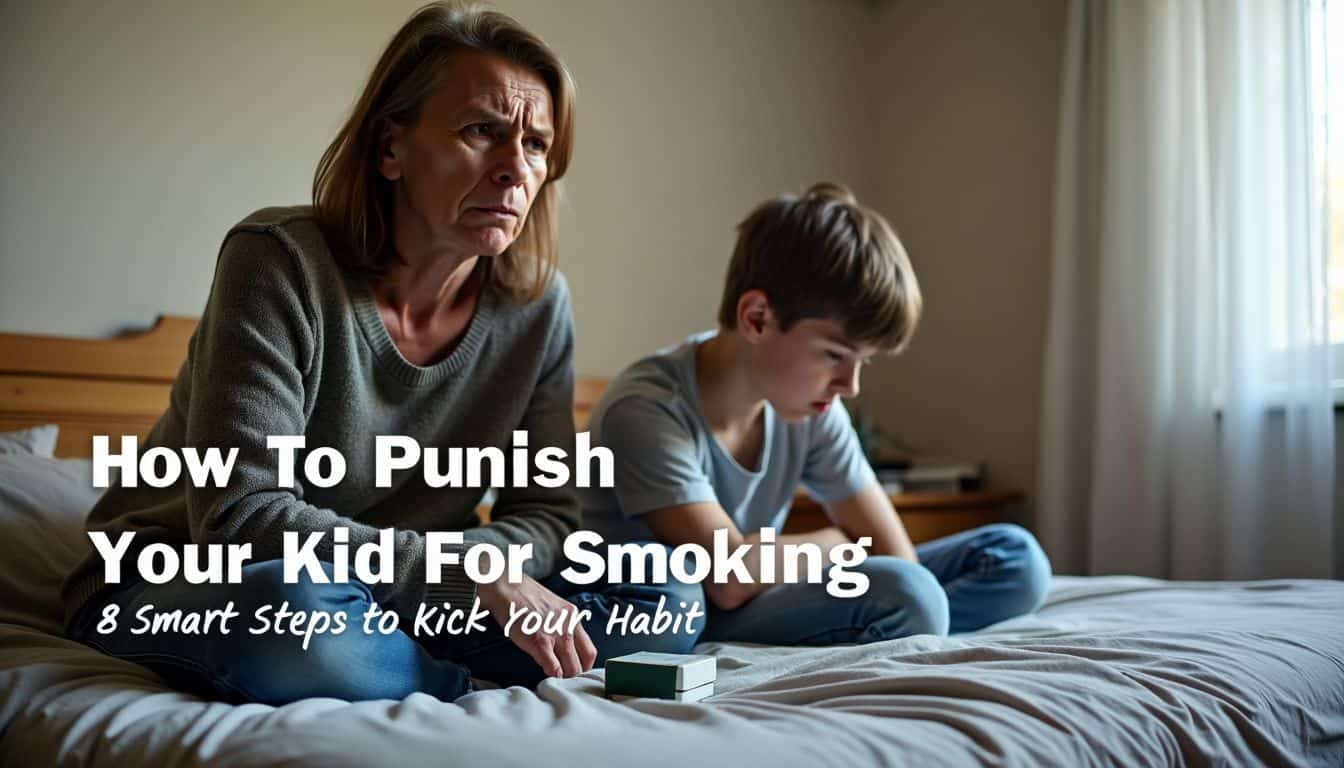Discovering your kid’s smoking habit can feel like a punch to the gut. Did you know that 90% of adult smokers started before age 18? This guide will show you how to punish your kid for smoking – and help them kick the habit for good.
Ready to tackle this challenge head-on?
Key Takeaways
90% of adult smokers started before age 18, showing how crucial it is to stop kids from smoking early.
Talk openly with your child about smoking’s dangers, including health risks and how it affects their looks.
Set clear rules and consequences for smoking, but focus on teaching rather than harsh punishment.
Encourage healthy activities and friendships to replace smoking habits.
Seek help from doctors or counselors if needed, as quitting can be very hard for teens.
Table of Contents
Identifying the Dangers of Smoking for Children

Smoking isn’t just bad for grown-ups. It’s a real threat to kids too. The risks go way beyond just coughing – we’re talking serious health problems that can last a lifetime.
Health risks linked to child smoking

Kids who smoke face big health risks. Their young bodies can’t handle tobacco’s harsh effects. Smoking hurts their lungs, making it hard to breathe and play sports. It also messes with their hearts, increasing the chance of serious problems later.
Worse yet, smoking at a young age often leads to lifelong addiction.
I’ve seen firsthand how smoking impacts young lives. My neighbor’s kid started at 14 and quickly developed a nasty cough. He couldn’t keep up in soccer anymore. The habit stuck, and now at 25, he’s still struggling to quit.
It’s scary to think that globally, over 4 million kids aged 13-15 smoke cigarettes. That’s a lot of young lives at risk for cancer, heart disease, and other preventable illnesses.
Psychological impacts of smoking on young individuals

Smoking hits young minds hard. It’s not just about lungs – it messes with their heads too. Kids who light up are more likely to feel down or anxious. They might think smoking helps, but it’s a trap.
The tobacco actually makes their moods worse over time.
Peer pressure plays a big role here. Teens often start smoking to fit in or look cool. But this choice can lead to bigger problems. It might hurt how well they do in school or sports.
Smoking can even change how their brains grow. Plus, if mom or dad smoke, kids are more likely to pick up the habit. Next, let’s look at what to do when you find out your child is smoking.
Initial Actions When Discovering Your Child Smokes

Finding out your kid smokes can hit you like a ton of bricks. But don’t panic – take a deep breath and get ready to tackle this head-on. Your first move? Have a heart-to-heart with your child about the real dangers of lighting up.
Discuss the dangers of smoking with your child

Talking to your kid about smoking isn’t fun, but it’s crucial. Be straight with them about the nasty health effects. Tell them how smoking can lead to cancer, mess up their heart, and wreck their lungs.
Don’t sugarcoat it. Share real stories about family members who got sick from smoking. That’ll hit home.
Kids care about looks too. Point out how smoking ruins their appearance. Yellow teeth, wrinkles way too early, and breath that could knock out a horse – not cute! Paint a clear picture of what smoking does to their body.
It’s not pretty, and they need to know. Your honesty might just save them from a dangerous habit.
Eliminate access to cigarettes and tobacco products

Getting smokes out of your teen’s reach is key. Start by clearing the house of any cigarettes or lighters. Check their room, backpack, and car if they drive. Don’t forget to look in sneaky spots like jacket pockets or desk drawers.
It’s not snooping – it’s smart parenting.
Next, cut off their cash flow. If your kid gets an allowance, stop it if you think they’re using it for cigs. Keep a close eye on their spending habits. And talk to other family members.
Make sure grandma isn’t slipping them money on the sly. It takes a village to keep kids smoke-free!
Strategies for Effective Discipline

Punishing your kid for smoking isn’t just about grounding them. It’s about teaching them why smoking is bad and helping them make better choices. Smart discipline strategies can help your child kick the habit for good – and maybe even save their life.
Implement consequences that impart lessons

Consequences for smoking should teach, not just punish. Take away privileges that matter to your teen. Maybe it’s their phone or hanging out with friends. The goal? To make them think twice about lighting up again.
Money talks too. Make your kid pay for their smokes or chip in for the family’s health insurance. It hits home when it hurts their wallet.
Natural consequences are the best teachers. – My mom always said.
I once caught my daughter smoking. Instead of yelling, I made her volunteer at a cancer ward. It opened her eyes real quick. The key is to be firm but fair. Don’t go overboard with harsh punishments.
That might push them to rebel more. Stick to consequences that make sense and avoid diaper punishment or other extreme measures.
Your goal is to help them quit, not to make them resent you.
Establish rules regarding smoking
Set clear rules about smoking in your home. No ifs, ands, or butts – smoking is off-limits. Period. This goes for everyone, not just your kid. Make it crystal clear that lighting up isn’t cool, and there’ll be consequences if they do.
Maybe it’s extra chores or losing phone privileges. Whatever you choose, stick to it.
Don’t stop at home, though. Talk about smoking in other places too. School, friends’ houses, parties – the whole shebang. Let your kid know you expect them to follow these rules everywhere.
It’s not about being mean. It’s about keeping them healthy and safe. Next up, let’s chat about long-term plans to keep your kid smoke-free.
Long-Term Plans to Deter Smoking

Keeping your kid smoke-free isn’t a quick fix – it’s a marathon. You’ll need to stay on your toes and keep tabs on who they hang out with and what they’re up to… but don’t be a helicopter parent! Mix it up by getting them hooked on fun, healthy stuff instead of cigs.
Monitor your child’s social interactions and activities
Staying aware of your kid’s social circle and interests is crucial. You don’t need to be overly watchful, but… stay informed. Be familiar with their friends and after-school activities.
If their buddies smoke, your child might feel pressured to join in. Encourage them to spend more time with non-smoking friends – it can help break the habit.
Show me your friends, and I’ll show you your future.
Activities are important too. Teens with too much free time might turn to smoking. Help them discover fun, smoke-free hobbies. Sports, art, or music can keep them engaged and healthy – and often come with new, non-smoking friends.
It’s a great combo!
Your aim is to guide, not control. Open communication and trust go a long way in helping your kid quit smoking.
Promote healthy alternatives to smoking
After keeping tabs on your kid’s social circle, it’s time to steer them toward better choices. Swap out those cancer sticks for some fun, healthy habits! Get your teen moving – maybe sign them up for a sport they’ve always wanted to try.
Exercise is a great way to show how smoking hurts their stamina. Plus, it’s a chance to make new friends who don’t light up.
Hobbies are another awesome distraction from smoking. Encourage your kid to join school clubs or try new activities. Maybe they’ll discover a hidden talent for painting or love belting out tunes in the school choir.
The goal? Fill their time with cool stuff that doesn’t involve puffing away. Trust me, I’ve seen this work wonders with my own kids. It’s all about giving them better options and showing them life’s way more fun without cigarettes.
Communication’s Role in Effective Discipline

Talking openly with your kid is key to making discipline work. It’s not just about laying down the law – it’s about building trust and understanding too.
Foster an open and honest relationship
Building trust with your teen is key. Talk openly about smoking without judgment. Listen to their reasons for trying it. Share your own struggles or mistakes if you’ve had them. This honesty creates a safe space for your kid to open up.
Keep conversations casual and frequent. Chat while doing chores or driving. Ask about their day and friends. Show interest in their life beyond just smoking. This helps your teen feel comfortable coming to you with problems.
Next, we’ll look at how experts suggest handling teen smoking.
The best way to get information from your kids is to listen, not lecture. – Anonymous parent
Emphasize positive reinforcement over punitive actions
Positive reinforcement works wonders when helping kids quit smoking. Instead of harsh punishments, try praising their efforts to stay smoke-free. Give a high-five for each day without cigarettes.
Or treat them to a movie for making it a whole week. These small rewards can boost their motivation big time. I’ve seen this work firsthand with my nephew. He felt proud and supported, which made quitting easier.
But don’t forget to set clear rules too. Let your teen know exactly what you expect. Maybe no hanging out with friends who smoke. Or losing phone privileges if caught with cigarettes.
The key is to stay calm and consistent. Yelling or extreme punishments often backfire. Focus on building trust and open talks about smoking. And keep in mind, there are better options instead of spanking or other physical punishments.
Guidance from Experts on Teen Smoking

Experts have a lot to say about teen smoking. They offer smart tips to help parents deal with this tricky issue.
Psychological strategies for addressing teen smoking
Teens often smoke to fit in or deal with stress. Smart parents use psychology to help their kids quit. They don’t just punish – they talk about feelings and find better ways to cope.
A family therapist can teach skills to resist peer pressure and manage anxiety. They might use cognitive-behavioral therapy to change thoughts about smoking. This approach tackles the root causes, not just the act of lighting up.
Positive reinforcement works wonders too. Parents can reward smoke-free days with extra privileges or small treats. It’s crucial to avoid shame or harsh criticism. Instead, boost self-esteem and teach healthy habits.
Exercise, art, or music can replace the urge to smoke. With patience and the right tools, parents can guide their teens to a smoke-free life.
Legal and healthcare perspectives on underage smoking
Legal experts and doctors agree: underage smoking is a big no-no. It’s not just frowned upon – it’s against the law. Kids caught puffing can face fines or even community service.
But it’s not about punishment. Healthcare pros focus on helping teens kick the habit. They offer counseling and support to young smokers. Some docs even suggest nicotine patches or gum to ease cravings.
The goal? Keep kids healthy and smoke-free.
Smoking hurts growing bodies more than adult ones. That’s why healthcare folks push for early intervention. They want to catch the habit before it sticks. Schools often team up with health centers to teach kids about smoking risks.
It’s all part of a bigger plan to keep our youth healthy. Next up, let’s tackle some common questions about dealing with teen smokers.
Addressing Common Questions on Disciplining for Smoking

Dealing with a teen who keeps smoking can be tough. Parents often ask, “What if my first try doesn’t work?” Don’t worry – there’s always a Plan B… and C and D!
Managing recurring smoking behavior
Helping a kid who continues to smoke can be challenging. Keep at it! Establish clear boundaries and maintain them. Reduce privileges such as phone time or socializing with friends.
But also discuss with your child their reasons for smoking. They might be dealing with stress or trying to fit in. Assist them in finding healthier ways to manage, like sports or art.
Be firm, yet caring. Express your concern for their health, not just about consequences.
If your kid continues smoking, consider seeking additional support. A doctor or counselor can provide professional guidance. They might recommend nicotine patches or gum to help with cravings.
Family therapy could be very helpful. It allows everyone to express their feelings and collaborate. Keep in mind, quitting is difficult. Your child may have setbacks. When they do, stay calm.
Gently remind them of the importance of stopping. With patience and encouragement, you can support your kid in overcoming this risky habit permanently.
Strategies when initial punishments fail
Sometimes, the first attempt to discourage your kid from smoking doesn’t work. Don’t give up! Try different approaches to help them quit. Chat with them about their reasons for smoking.
Maybe they’re dealing with stress or trying to fit in. Find out what’s really going on. Then, collaborate on a strategy that suits their needs.
If conversations and rules don’t help, think about getting outside help. A doctor or counselor can provide fresh ideas. They might suggest nicotine patches or gum to ease cravings.
Or they could teach your teen ways to handle stress without smoking. Quitting is tough. Praise any progress, no matter how small. Rewards for staying smoke-free can be more effective than punishments for slipping up.
People Also Ask
How can I tell if my teen is smoking?
Look for signs like the smell of smoke on clothes, yellow teeth, or frequent “walks.” Keep an eye on their social media and friend group. Changes in behavior, grades dropping, or mood swings could also hint at smoking or substance use.
What are the health risks of teen smoking?
Smoking harms the teenage brain and can lead to addiction. It ups the chances of lung cancer, heart disease, and other smoking-related illnesses. It can also affect mental health, causing depression and anxiety. The World Health Organization warns it’s a major health threat.
Should I use parental controls to stop my kid from accessing smoking info online?
Parental controls on devices and web filters can help, but they’re not foolproof. Instead, focus on open talks about the dangers of smoking. Build trust, so your teen feels comfy sharing their experiences and struggles with you.
How can I help my kid quit smoking?
First, don’t flip out. Stay calm and chat about why they started. Look into nicotine replacement therapy or professional help if needed. Boost their coping skills to handle stress without smokes. Remember, quitting’s tough, so be patient and supportive.
What if my teen is also using other substances like alcohol or marijuana?
This could signal a bigger problem. Seek help from a substance use disorder specialist or rehab center. They can check for dual diagnosis issues and provide tailored treatment. Don’t ignore it – early intervention is key.
How can I prevent my kid from starting smoking in the first place?
Start early with honest talks about smoking risks. Set a good example by not smoking yourself. Teach stress-busting techniques and boost their self-esteem. Keep tabs on their friends and activities. Remember, a strong parent-child bond is your best defense against teen smoking.
References
https://www.ncbi.nlm.nih.gov/pmc/articles/PMC4934164/
https://www.ncbi.nlm.nih.gov/pmc/articles/PMC4766106/
https://www.ncbi.nlm.nih.gov/pmc/articles/PMC3715391/
https://www.ncbi.nlm.nih.gov/pmc/articles/PMC6688600/
https://www.betterhealth.vic.gov.au/health/healthyliving/smoking-how-to-discourage-your-children
https://www.ncbi.nlm.nih.gov/pmc/articles/PMC5325732/
https://heidisongs.blog/consequences-that-teach-better-behavior-instead-of-punish/
https://www.unicef.org/parenting/child-care/how-discipline-your-child-smart-and-healthy-way
https://www.ncbi.nlm.nih.gov/pmc/articles/PMC2719514/
https://positivepsychology.com/parenting-positive-reinforcement/
https://www.ncbi.nlm.nih.gov/books/NBK179276/
https://www.ncbi.nlm.nih.gov/pmc/articles/PMC10073720/
https://www.safes.so/blogs/how-to-punish-your-kid-for-smoking/
